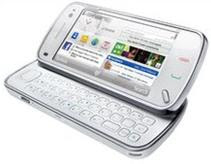Tuesday, February 16
Intel & Nokia merge software to have MeeGo
The new MeeGo platform, unveiled at the Mobile World Congress in Barcelona, will be used to power phones, netbooks, TVs and in-car entertainment systems.
The world's largest chip maker and the world's largest mobile phone maker have merged operating systems to create a single platform for mobiles.
The open-source software has been created by merging elements of Intel's Moblin and Nokia's Maemo software.
The two firms first announced their intention to collaborate in June 2009.
Ian Fogg, an analyst at Forrester Research, said that the merger was a "bold play" and placed MeeGo into a "competitive position with Android, iPhone OS, Google's Chrome and even desktop software like Ubuntu".
The mobile industry tends to favour chips from UK firm Arm, rather than Intel.
Microsoft launched latest version phone operating system - Windows Phone 7 series.
The software has a redesigned user interface and incorporates many Microsoft services such as Xbox LIVE games and the Zune music service.
The software was introduced at an event at the Mobile World Congress in Barcelona.
The new system follows the launch of Windows Mobile 6.5 in October 2009.
"This is obviously a huge step forward," analyst Pete Cunningham of Canalys told BBC News.
"Microsoft have really struggled with windows mobile 6 and 6.5 and have been losing market share off the back of it."
However, he said, the firm could not "rest on its laurels".
"Although it looks good today and competitive today, the other other firms haven't revealed their hand.
"It doesn't launch for another eight or nine months and that's a long time in the mobile world."
For example, in a little over 30 months Apple has claimed 15% of the smartphone market, according to Canalys figures, whilst Google's Android operating system has claimed 5% of the market in around two years.
Wednesday, February 10
Google Launched its Social Network - Buzz
Buzz Service is integrated directly with in e-mail service of Gmail which allows users to post status updates and share content and read and comment on friends posts.
Google Buzz is directly against rival networks such as Facebook, which has amassed nearly 400 million users since its launch in 2004.
Buzz will capitalise on the number of regular Gmail users, which is currently around about 170 million people.
BBC News technology correspondent Rory Cellan-Jones said that the launch appeared to be a "major land grab by Google for the social networking space".
Google Buzz is directly against rival networks such as Facebook, which has amassed nearly 400 million users since its launch in 2004.
Buzz will capitalise on the number of regular Gmail users, which is currently around about 170 million people.
BBC News technology correspondent Rory Cellan-Jones said that the launch appeared to be a "major land grab by Google for the social networking space".
Thursday, February 4
Symbian goes Open Source
 The group behind the world's most popular smartphone operating system - Symbian - is giving away "billions of dollars" worth of code for free.
The group behind the world's most popular smartphone operating system - Symbian - is giving away "billions of dollars" worth of code for free.The Symbian Foundation's announced that it would make its code open source in 2008 and has now completed the move.
It means that any organisation or individual can now use and modify the platform's underlying source code "for any purpose".
Monday, February 1
Subscribe to:
Comments (Atom)



